Am I doing enough in our homeschool?
Written by Shawna Wingert of Different by Design Learning
After ten years of homeschooling, there is one thing I know to be true.
I am most likely to doubt, question and fear my own ability as a homeschool mom in the middle of the night.
Last night was no exception.
Having some trouble getting back to sleep, I began to go through the previous day in my head.
My son’s resistance to writing.
The video we watched on YouTube instead of doing the actual history assignment.
The to-do list left undone at the end of the day.
As I tossed and turned, one familiar question haunted me.
Would you rather listen to this post?
Am I doing enough for these children?
I know I am not alone in asking this, nor is this a new question. Over the past decade, I know I have asked it hundreds, if not thousands of times.
It’s a question that comes up at every homeschool get-together and in every homeschool mom Facebook group.
We carefully ask other moms what they think. We worry they don’t really understand our realities when they tell us we are doing well and it will be okay.
We wonder, when we hear about a new curriculum or book list.
We whisper it to ourselves on the days when things don’t go as planned.
Am I doing enough?
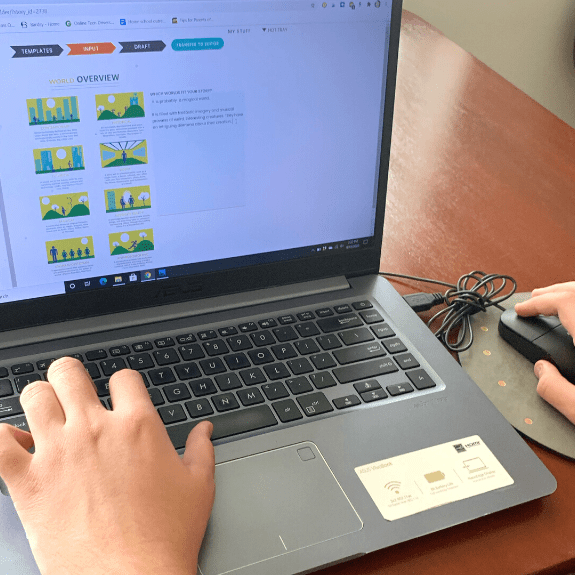
One of the most challenging aspects of being a homeschool mom, for me, is feeling like I never really know how well I am doing.
At all my other jobs, I had a boss. I had performance appraisals. I had a sense of what right looked like and how well I was doing.
Homeschooling gives us none of that.
And yet, the longer I educate my own children, the more I am finding ways to answer this question, when it rears its ugly head.
Am I doing enough in our homeschool?
If you struggle with this same sense of not knowing, I want to encourage you today that you are not alone.
In fact, I have never met a homeschool mom who didn’t wonder, at least sometimes, if her efforts would be enough to successfully educate her children.
When this question creeps up, this is what helps me most.
Stop Asking, “Does this count?”
It is so easy to feel like I am not doing enough in our homeschool when I am concerned about what “counts” as learning and what doesn’t.
For example, it’s easy to feel like my son taking a quiz or completing a worksheet “counts,” because it looks more like the public school model that so many of us grew up in.
But what about the Batman graphic novel he was obsessed with all day, or the Geography Now YouTube video we watched, with its tongue in cheek look at what defines the 50 states? Do these count?
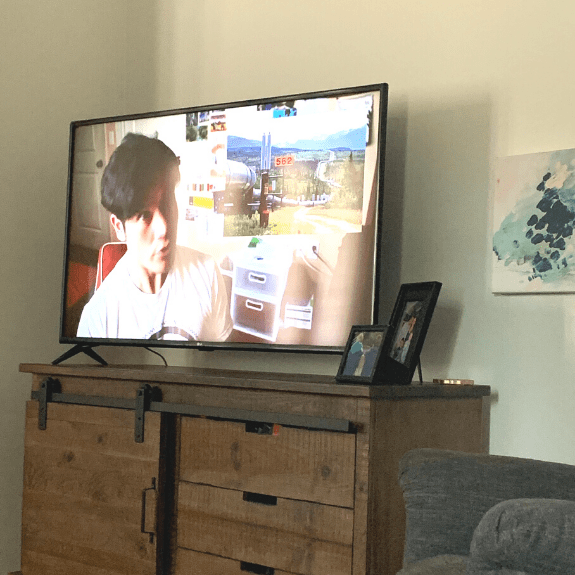
While I am still prone to worry, I have learned that if I am asking if something counts, it usually does.
Learning is an element of almost everything we do, in life and in homeschool. It’s easy to see it when I take a step back and really think about the skills my children are practicing.
The graphic novel allowed him to practice reading and think about story. The video sparked an interesting conversation about northern states and political divides.
I could go on and on, but essentially, instead of asking if something counts as learning, I ask, “What did my children learn from this activity?”
Establish a daily minimum.
This has evolved considerably over the past few years, but it is genuinely making a difference in our homeschool.
At the beginning of the school year, I define what I think are the most important things we need to accomplish everyday (and not just academically). This list of no more than five things becomes my minimum expectation for our days.
Below is my “even if nothing else happens, I will consider this enough” daily list for this year for my youngest son.
- Audiobook and read to mom
- Sensory activity or rock climbing
- CTC Math – one 5 minute lesson
- Current events discussion
- One item from weekly list
In addition to our daily plan, I create a weekly list of ideas and activities to add to the above. We only add an item from the weekly list if we are in a good place and able to take on more (which, if I’m honest, is about 50% of the days).
Here is a picture of my plans for last week.
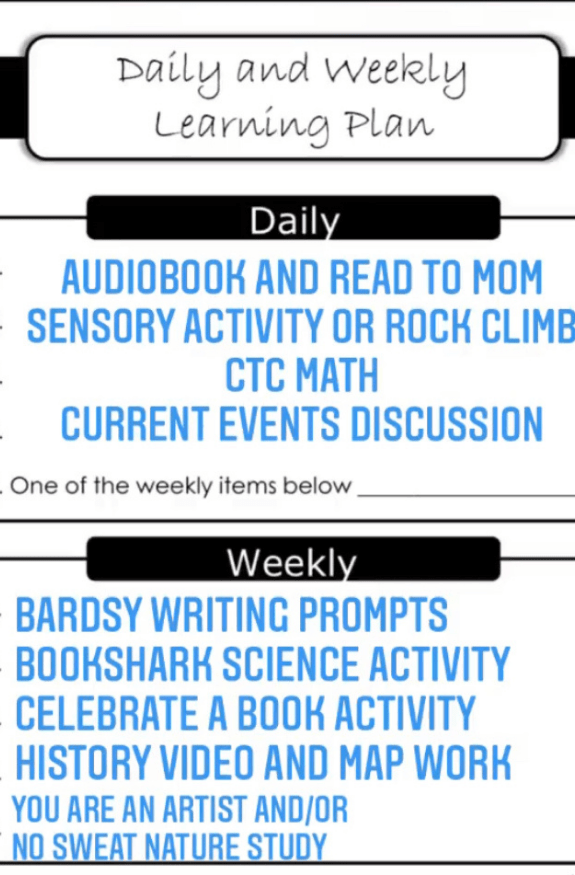
The daily list of requirements helps me start the day with a sense of things being doable from the start, instead of behind before we even get started.
Most important, it feels like enough.
Accept that resistance will come.
It is really, really hard to not take my sons’ resistance to learning personally, especially when I have worked hard to prepare an activity or define our plans for the day. Their resistance often triggers guilt and leads to be me being up in the middle of the night asking if I am doing enough.
But the truth is that resistance and not wanting to do something that is required of us is a part of learning. It is a part of homeschooling.
Accepting this reality helps me feel like what we are accomplishing, even in the midst of some resistance, matters.
Know that it all adds up.
I have to remind myself of this over and over again, but I know it to be true.
After all these years, I can see that all the small decisions, the seemingly unfocused afternoons, the audiobooks listened to in the car, the visits to the zoo, the conversations over the dinner table, the rock climbing lessons and yes, the worksheets and math lessons done on the computer – it all adds up.
It all adds up to a well-rounded and effective education.
It adds up to more than enough.
What’s Your Homeschool Mom Personality? Take Jamie’s quiz now and receive a free personality report to help you organize your homeschool based on what your personality type needs most!
Originally posted on October 5, 2021

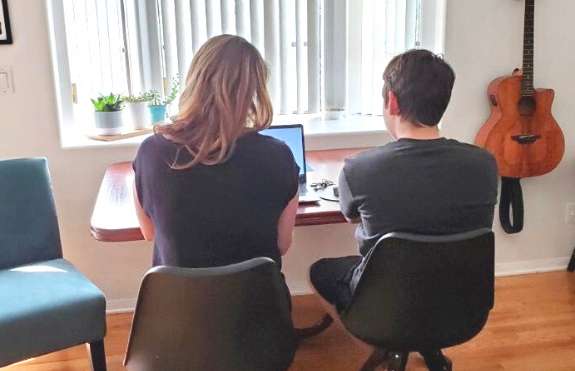
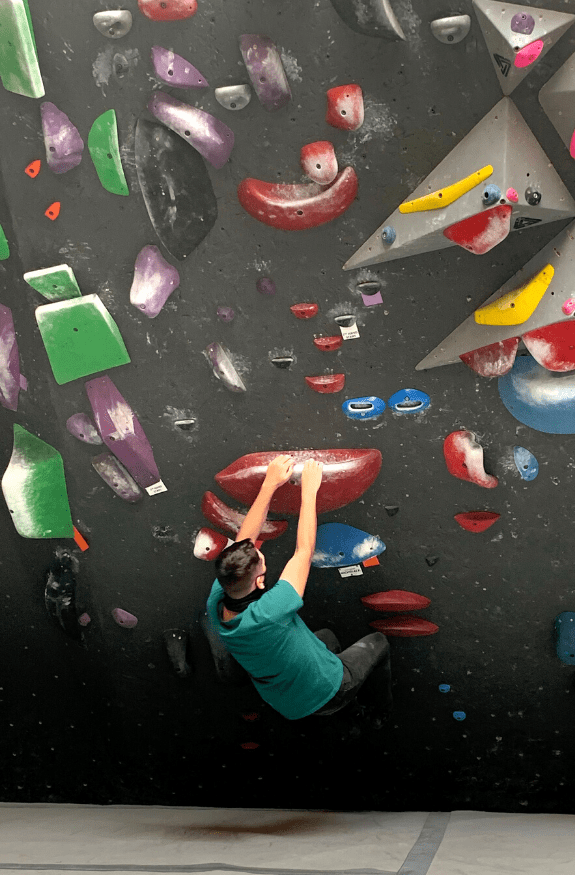
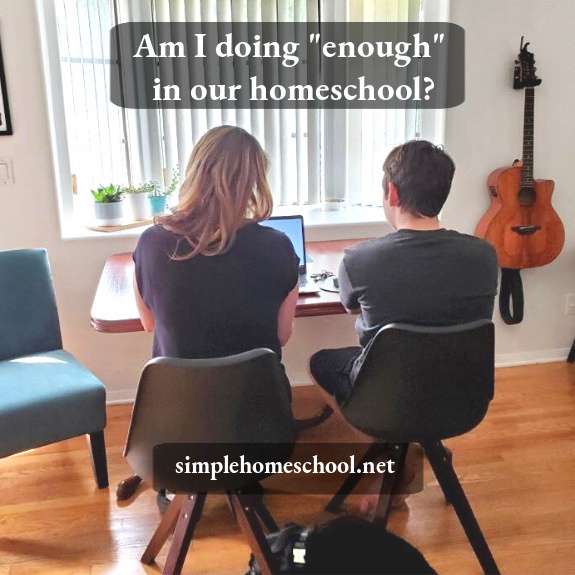
 Weekend homeschool links: October 13th
Weekend homeschool links: October 13th
Thank you. I might be crying.
I can totally relate, Ashley. You are so very welcome.
Shawna Wingert’s latest post: 10 Things You Can Do Right Now To Help A Resistant Learner
Gracias…. Que edificante.. Saludos desde México
Thank you so much! I have struggled with this for years. With one that hates the table/book learning and one learning disability. I worry. It’s nice to know we are doing okay. That they are learning. I have PS comparisons from others and start to worry all over again.
You are doing OK! It really is a part of this homeschooling journey. 🙂
Shawna
Shawna Wingert’s latest post: 10 Things You Can Do Right Now To Help A Resistant Learner
Shawna, thank you so much for this. I had one of those middle-of-the-night episodes just last night! I feel like the way we educate our differently-wired son is perfect for him, but I worry the “powers that be” might think otherwise (he’s a senior this year so the college readiness question looms large).
Oh, and we love Geography Now!
Geography Now is my best friend these days! I know what you mean about the “powers that be.” My oldest is a senior too this year. So far, so good!
Shawna Wingert’s latest post: 10 Things You Can Do Right Now To Help A Resistant Learner
I really liked this article and I feel less alone in the doubting and guilt that sometimes assault me.
My son is only 8.5 y, but he has been resistant to certain skills, like reading and writing, since we began. He’s still resisting stuff on a daily basis. And because of that and the fact that it takes us a lot of time to do the minimum I have set up for this year, I sometimes feel like I’m not doing enough, that we don’t even get to the good part in homeschooling.
Aside from establishing a minimum weekly “schoolwork” load, I find that it has really helped me to write down what we do each day. I can then see for myself that we did accomplish many things that otherwise I would not consider when thinking about my day.
I don’t actually write down all of it, especially his independent accomplishments.
So I encourage every homeschooling mom to spend a few minutes jotting down the stuff that got done every day in a weekly planner or just a blank page that’s split into the days of the week. It’s very satisfying to see that you are actually able to accomplish many things throughout the day! Even if it may not seem like it sometimes.
Amazing blog!!! Thanks for sharing such great blog, its really helpful.
It’s easy to feel like you’re not doing enough when homeschooling. I think the best way to figure this out though is to look at your children. Are they happy? Do they interact well with other kids their age? Are they intrigued by new experiences? If so, they’re far and away better than most children. Homeschooling opens the door for such a better experience for our kids!
I just got done logging the hours we’ve put in this past month for each academic subject. It’s a requirement in Missouri for homeschooling, and while I hate keeping up with it all day long every day, it is a hard and fast way for me to see just how much my kids are learning. They really do learn all day long! Just about everything “counts” and I’m slowly learning this fact. Yet somehow each day I still end feeling like we didn’t do enough somehow – according to the public school model.
Thank you for this post! It’s so encouraging and true! I’d encourage readers to take a week and write down what all their kids did each day and for how long. It won’t take more than a few days to see just how much MORE than “enough” we really are doing. <3
I am helping a mum homeschool her children in the Middle East. A 5 year old and a 7 year old. Today I wondered am
I doing enough?
The 7 year old can already read and write English after just 3 weeks which
I think is incredible. (I teach 2days a week) The 5 year old is really struggling. English is their 2nd language.
I really hope I am doing enough.
I may increase the time of teaching them but there are issues regarding this too.